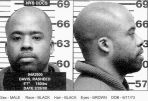My name is Robin. I was born in Portland, OR but grew up my whole life across the river, in Vancouver, WA. I was fortunate enough to be raised in a home where I could feel safe and know I was loved. My mother took me to Sunday school and taught me the love of Jesus. Every teacher I ever had liked me and I did we’ll in school. Growing up I was popular, and had a lot of friends.
I became alcoholic after my first drink at 14-years-old. Gradually through my adolescence, I began experimenting with other substances and they became more important to me than school. After miserably failing almost two years of college, I dropped out. I had just turned 21 before I met the man who sold me a dream. The dream turned into a nightmare and the nightmare lasted six years. In those six years I was prostituted up and down the I-5 corridor from Seattle to San Francisco, Los Angeles, Phoenix, Las Vegas, and Honolulu, Hawaii. I walked away from my pimp in 1999, penniless, alcoholic, and addicted to crack-cocaine. I have never gone back to him.
It took me over 12 years away from the life to be strong enough to really look at what had happened to me. I was 21 years old when my pimp walked into my life and because I was an “adult”, I always carried the guilt and shame for “choosing” this lifestyle. I wasn’t ready to look at my past until I learned about my past. Once I learned about my past, I gathered enough strength and humility to tell my story. Telling my story and backing it up with the truths, rather than misconceptions about prostitution, allowed me to heal. When I saw myself as a victim, no matter my age- that’s when I was able to forgive myself and move on.
Defenders were few and far between when I was living in the streets where men bought and sold women and young girls for sex. There was only one Defender who could save me from the bondage of sex-trafficking; that Defender was Jesus! I often wonder if my life would have turned out differently if there were more men of God living as Defenders.
Despite growing up in a good home, learning manners and respect, no one taught me to love or respect myself. When I see men taking the Defender’s pledge today, my heart fills with love and hope for the future; but I don’t see enough men taking the pledge. I want to see our nation’s leaders, our pastors, and our teachers taking the pledge.
I want to see these men teaching our sons how to live as Defenders of women and how to stand up against immorality — without feeling like there is something wrong for doing so. When a man promises not to purchase or participate in pornography, prostitution or any form of the commercial sex industry, demand decreases.
“But as for you, O man of God, flee these things. Pursue righteousness, godliness, faith, love, steadfastness, gentleness” (1 Tim 6:11). When a man promises to hold his friends accountable for their actions toward women and children, our daughters become safer and demand decreases. “Iron sharpens iron, and one man sharpens another” (Prov. 27:17). When a man promises to take immediate action to protect those he loves from this destructive market, families are not torn apart and demand decreases. “But if anyone does not provide for his relatives, and especially for members of his household, he has denied the faith and is worse than an unbeliever” (1 Tim 5:8).
When I see men taking the pledge to be a Defender, I see God moving.
Robin became involved with trafficking when she was recruited by a pimp in 1993. After six years of abuse and many near death experiences, she was delivered by her Savior Jesus Christ in 1999. In June 2012, Ms. Miller earned her bachelor’s degree in Social Science from Portland State University. She is active as an advocate for victims of sex-trafficking. Today Robin is the volunteer coordinator and receptionist for a non-profit organization in Vancouver, WA.

 Jay-Z’s catchy hit from 2000, hasn’t lost any novelty during its ten year run in the music industry. It even costs $1.29 on iTunes—the price reserved for only the most popular songs within the virtual-jukebox—instead of the standard $.99. In a culture where pimps are idealized as wearing bright orange top-hats, luxurious furs and sporting fancy canes, who wouldn’t want to be “doin’ big pimpin’ up in NYC”? I offer two basic reasons why becoming a pimp can be so appealing in 2010, but please remember, my rudimentary analysis is by no means exhaustive. I simply suggest that the promise of being cool and making lots of money can be a deadly combination that has created an enticing outlet for the up-and-coming commercial sex entrepreneur.
Jay-Z’s catchy hit from 2000, hasn’t lost any novelty during its ten year run in the music industry. It even costs $1.29 on iTunes—the price reserved for only the most popular songs within the virtual-jukebox—instead of the standard $.99. In a culture where pimps are idealized as wearing bright orange top-hats, luxurious furs and sporting fancy canes, who wouldn’t want to be “doin’ big pimpin’ up in NYC”? I offer two basic reasons why becoming a pimp can be so appealing in 2010, but please remember, my rudimentary analysis is by no means exhaustive. I simply suggest that the promise of being cool and making lots of money can be a deadly combination that has created an enticing outlet for the up-and-coming commercial sex entrepreneur. the “ghetto-fab” lifestyle. Just ask Border’s bookstore sales representative Margaret Rhatican about her experiences working in a place where you are sure to find the story of A Pimp’s Life within a series of books about “working the streets.” Just in case one needs a little extra guidance, Amazon offers The Pimp Game: Instructional Guide for pimps in training. In the world of cinema, movies like
the “ghetto-fab” lifestyle. Just ask Border’s bookstore sales representative Margaret Rhatican about her experiences working in a place where you are sure to find the story of A Pimp’s Life within a series of books about “working the streets.” Just in case one needs a little extra guidance, Amazon offers The Pimp Game: Instructional Guide for pimps in training. In the world of cinema, movies like  A pimp is not only a member of the “awesome-elite,” he’s rolling in the dough. It’s the most secure job in an un-secure economy. It’s “recession proof,” says Linda Smith in her book
A pimp is not only a member of the “awesome-elite,” he’s rolling in the dough. It’s the most secure job in an un-secure economy. It’s “recession proof,” says Linda Smith in her book What can be done to take the glitter and glamor out of the pimp-life? Change the vernacular. Searching the words trafficker, rapist, or abuser does not elicit the same Google images of fur, hats, and fancy canes as the pimp search, but instead, reveals truer depictions of the atrocity associated with each term. This necessary shift will take time and a complete transformation in society’s ingrained perceptions. Would a different approach that could act as a catalyst for such a change be more effective? Demi Moore and Ashton Kutcher think it’s possible. They have started a trend focusing on positive reinforcement with the
What can be done to take the glitter and glamor out of the pimp-life? Change the vernacular. Searching the words trafficker, rapist, or abuser does not elicit the same Google images of fur, hats, and fancy canes as the pimp search, but instead, reveals truer depictions of the atrocity associated with each term. This necessary shift will take time and a complete transformation in society’s ingrained perceptions. Would a different approach that could act as a catalyst for such a change be more effective? Demi Moore and Ashton Kutcher think it’s possible. They have started a trend focusing on positive reinforcement with the





